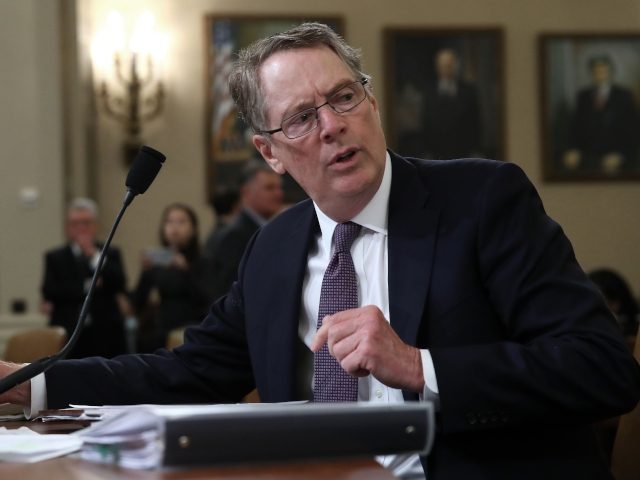House Republicans and Democrats are joining retail corporations to ask United States Trade Representative (USTR) Robert Lighthizer to reduce tariffs on China in the midst of the Chinese coronavirus crisis.
The National Retail Federation (NRF) is circulating a pre-written letter asking Lighthizer to reduce U.S. tariffs on China and extend tariff exemptions so certain corporations continuing to make their goods in China are exempt from having to pay significant costs to export their products back into the U.S. marketplace.
The letter, obtained by Breitbart News, has already been signed by Representatives Jackie Walorski (R-IN), Darin LaHood (R-IN), Ron Kind (D-WI), and Colin Peterson (D-MN). The NRF is also lobbying other members of Congress to sign on.
The letter to Lighthizer reads:
We write today to strongly urge you to extend all active exclusions from the Section 301 China tariffs, which are currently scheduled to expire on December 31, 2020, for an appropriate amount of time to provide economic stability as businesses grapple the unprecedent hardships caused by the COVID-19 pandemic. [Emphasis added]
This issue is of vital importance. Our economy remains in a fragile state due to the ongoing COVID-19 pandemic, and many of the expiring exclusions are critical to the pandemic response. They cover inputs for household and professional cleaning goods, as well as personal protective equipment (PPE) and other medical supplies for doctor’s offices and hospitals. This includes equipment for the administration of the vaccines that we all hope will defeat COVID-19. We should certainly examine our reliance on China for these articles and increase U.S. production, and we are actively engaged in crafting policies to do so. However, reducing tariffs is still necessary to maximize our supply of PPE and other supplies while companies build production capacity in the U.S. and re-shore supply chains. [Emphasis added]
Additionally, extending these exclusions will provide needed certainty for employers and help save jobs. The impact of expiration would be especially felt by small businesses that have been hardest hit through no fault of their own by stay-at-home orders and other measures taken to fight the pandemic. We recognize that the exclusions were granted in part on the premise that businesses need adequate time to relocate their supply chains out of China. However, manufacturing has taken a severe hit this year, making it extremely difficult amid this crisis to identify potential suppliers in the United States or abroad. With global travel essentially shut down, it has been difficult, if not impossible, for company representatives to travel to and inspect potential new sites and to build relationships with new partners. Again, small businesses are disproportionately harmed. [Emphasis added]
Extending exclusions before they expire will help with pandemic response, and it will save jobs, businesses, and livelihoods. We strongly urge you to extend all active exclusions before they expire at the end of this year. [Emphasis added]
NRF executives are currently emailing members of Congress asking them to sign the letter. In a copy of one email, obtained by Breitbart News, lawmakers are told that businesses need U.S. tariff exclusions on China to survive.
“As businesses around the country continue to recover from COVID-19’s [Chinese coronavirus] economic impact, they need as much certainty as possible to ensure a full and successful recovery,” the NRF email to lawmakers reads. “The expiration of the China 301 tariff exclusions will make it even more difficult for American businesses to recover. These companies will face a significant tax hike on January 1, 2021 if the exclusions are not extended.”
The lobbying effort comes as the nation’s decades-long free trade policies put the U.S. in a bind as masks, protective gear, hand sanitizer, ventilators, plastic bottles, pharmaceuticals, and rubber gloves are predominately made in foreign countries like China, India, and Malaysia.
At one point, U.S.-based companies had ramped up their production of hand sanitizer and other cleaning products but had no way of quickly distributing and selling the goods to Americans because of a shortage of plastic bottles, which mostly come from China.
In response, White House trade adviser Peter Navarro has led a national response effort to push multinational corporations to relocate their supply chains out of China and back to the U.S. Many corporations, including those associated with NRF, have made no such effort thus far.
Research by the Coalition for a Prosperous America (CPA) has revealed that reshoring all pharmaceutical production to the U.S. would create more than 800,000 American jobs. Likewise, reshoring all medical supplies to the U.S. has the potential to create more than 300,000 American jobs.
For years, economic nationalists have urged the Trump administration to make permanent its 25 percent tariffs on billions of Chinese imports. CPA economists have said that a permanent 25 percent tariff on all Chinese imports would bring a million jobs back to the U.S. by 2024.
John Binder is a reporter for Breitbart News. Follow him on Twitter at @JxhnBinder.

COMMENTS
Please let us know if you're having issues with commenting.